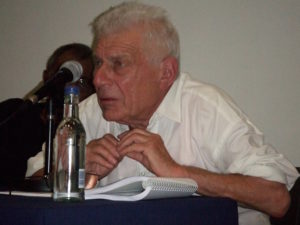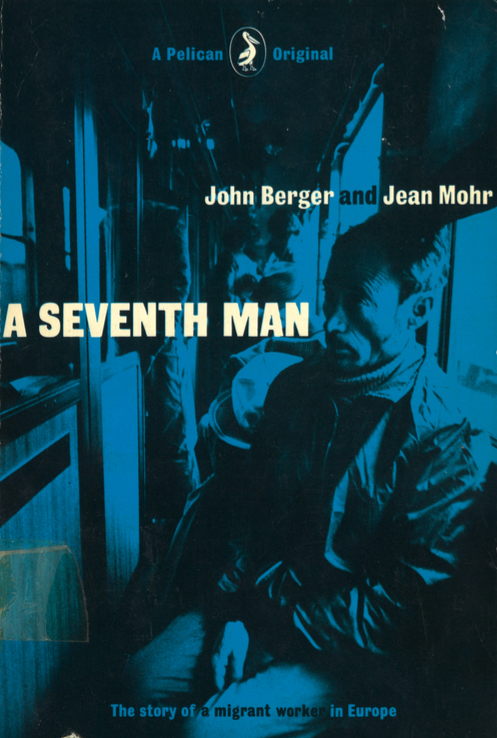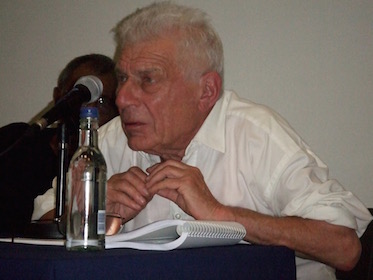John Berger, writer, art critic and poet has died. John Berger, anti-imperialist, socialist man and peasant has died.
It is perhaps inevitable that the establishment should claim John Berger for their own, as the famous critic who provided the BBC and them with ‘Ways of Seeing’ in 1972 – and that despite his Marxism. It was and still is a milestone in interpreting art and ‘the gaze’. But he did not live his life in compartments or by accepting borders –geographical or disciplinary. For many of us who now mark his passing, his greatness lies in his practice as a committed and true intellectual and internationalist.

And his commitment did not begin with perfecting a or just one profession. As he told Victoria Brittain after he won the 2009 Golden PEN: ‘For me, there were too many political urgencies to spend my life painting. Most urgent was the threat of nuclear war – the risk of course came from Washington, not Moscow. And now, living in a village is very social, much more than the city. And the practical tasks – shovelling snow, the political tasks which come on email – I do these first before I sit down to write.’
He might have been blessed with the abilities to draw, to imagine in prose and verse, to analyse and criticise but he chose to put those qualities at the service of others – or rather to allow others to engage him in their service. To apply an overused phrase like ‘public intellectual’ is to damn him with faint praise but that is exactly what he was and what such an intellectual should be.
He took on the scourges of the day – imperialism, exploitation of migrant labour, the death of Europe’s peasantry, Aids, shanty towns, street life, political prisoners, the oppression of the Kurds, the horrors of Palestinian dispossession, the struggles of the peasants in Chiapas, Mexico … And perhaps we should recall his prophetic comment over the Rushdie affair in 1989:
‘I suspect that Salman Rushdie, if he is not caught in a chain of events of which he has completely lost control, might, by now, be ready to consider asking his world publishers to stop producing more or new editions of The Satanic Verses … Otherwise a unique 20th-century holy war, with its terrifying righteousness on both sides, may be on the point of breaking out sporadically but repeatedly – in airports, shopping streets, suburbs, city centres, wherever the unprotected live.’
 I, like many of my generation, first became aware of John Berger in his dramatic act of throwing back his 1972 Booker McConnell prize for the novel G into the face of the company that had so long exploited British Guiana, by awarding half the money to the UK-based Black Panther Movement and half to his research with photographer Jean Mohr into the slave-like conditions of migrant workers in the European metropole. One could argue that his 1975 A Seventh Man (one in seven manual workers being migrants from Europe’s periphery) was as much a political milestone as Ways of Seeing. For it took up the then overlooked issue – the shifting sands of globalisation, the fact that Europe was dependent on a ‘racialised’ surplus army of labour – that would, by 2016, split the UK nation. His trilogy Into Their Labours (written between 1974 and 1990, travelling from the very real and reimagined stories of his co-villagers in the Haute Savoie in Pig Earth and Once in Europa to the mythical or surreal Lilac and Flag) went on to mark the ‘survival’ of the peasant class, i.e., the enforced movement of the peasant to the city and its shanties.
I, like many of my generation, first became aware of John Berger in his dramatic act of throwing back his 1972 Booker McConnell prize for the novel G into the face of the company that had so long exploited British Guiana, by awarding half the money to the UK-based Black Panther Movement and half to his research with photographer Jean Mohr into the slave-like conditions of migrant workers in the European metropole. One could argue that his 1975 A Seventh Man (one in seven manual workers being migrants from Europe’s periphery) was as much a political milestone as Ways of Seeing. For it took up the then overlooked issue – the shifting sands of globalisation, the fact that Europe was dependent on a ‘racialised’ surplus army of labour – that would, by 2016, split the UK nation. His trilogy Into Their Labours (written between 1974 and 1990, travelling from the very real and reimagined stories of his co-villagers in the Haute Savoie in Pig Earth and Once in Europa to the mythical or surreal Lilac and Flag) went on to mark the ‘survival’ of the peasant class, i.e., the enforced movement of the peasant to the city and its shanties.
I know I cannot do justice to all the causes of the downtrodden and dispossessed that John espoused in his long and active life. (Perhaps others can add to this tribute the events he graced and associations he made.) His work is scattered with references to places, countries, people, languages he has known; his collaborations with fellow artists and activists were legendary. His reach was huge and his eye and ear ever acute.
All I know is that from 1994 he was an active supporter of Peace in Kurdistan, from 1995 in close contact with Subcomandante Marcos of the Zapatistas, and, from the early 2000s, immersed himself in the struggle for justice for the Palestinians. In the interview with Victoria Brittain, he explained, ‘I’ve only been actively concerned with Palestine as a writer for about seven years. But the crisis, the injustice, the suffering of the Palestinians, have coexisted alongside my whole life as a writer. The length of this injustice, the lack of recognition of it by the rest of the world, while Israel pursues its own logic, totally regardless of the views of the external world – all this I was not conscious of then, but I am now.’
Obviously that consciousness ran deep. Berger was to visit Palestine a number of time and with Rema Hammami he translated Mahmoud Darwish’s long poem Mural. He wrote evocative, personal reflections about Palestine including ‘Stones’ in Hold Everything Dear in which he put, ‘I unhesitatingly identify myself with the just cause and the pain of those whom the state of Israel (and cousins of mine) are afflicting to a degree that is tragically totalitarian’. In ‘Undefeated Despair’, he writes ‘Everywhere one goes in Palestine – even in rural areas – one finds oneself amongst rubble, picking a way through, round and over it … the rubble is of houses, roads and the debris of daily lives … There’s also the rubble of words – the rubble of words that house nothing anymore, whose sense has been destroyed.’ (Race & Class 48/1, 2006) Though his 2008 From A to X: a story in letters has no acknowledged country, the ‘novel’ is dedicated to assassinated Palestinian novelist Ghassan Kanafani, whose work Berger was to read from at the inaugural address to the Palestine Festival of Literature in 2008. And Berger, too, led the call for a cultural boycott of Israel: ‘chosen protests together … breaking the silence of connivance maintained by those who claim to represent us’, though, scrupulous to the last, he felt it was up to each individual as to how to break the silence.

We were lucky enough to have John’s support on the Editorial Working Committee of IRR’s journal Race & Class across three decades. But the words he wrote for us in The Threat of Globalism issue (Race & Class 40/2-3, 1999) about the struggle ahead could not be more timely now in the world we face in the Brexit/Trump era:
‘First an horizon has to be discovered. And for this we have to refind hope – against all the odds of what the new order pretends and perpetrates.
Hope, however, is an act of faith and has to be sustained by other concrete actions. For example, the action of approach, of measuring distances and walking towards. This will lead to collaborations which deny discontinuity. The act of resistance means not only refusing to accept the absurdity of the world-picture offered us, but denouncing it. And when hell is denounced from within, it ceases to be hell.’
Related links
IRR News tribute by A. Sivanandan: John Berger: truth-sayer in an age of lies
Download a collection of free Race & Class articles: A Celebration of John Berger
Sons of Malcolm blog: Comrade John


Another hero from my youth has died.
What a great thinker! What a great human being. From ‘Ways of Seeing’ to ‘The Success and Failure of Pablo Picasso’ and way, way beyond. He had an indelible affect on my life and on my thinking. Above all, he confirmed my understanding of the world and how it works.
Hamba Kahle John Berger
Yes-same here, I grew up with Berger’s books. I’ve bought nearly all of them! He will be sadly missed !